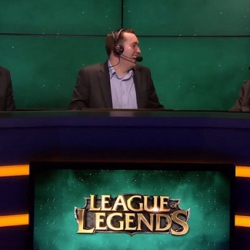
League of Legends Is the Most Popular of the Esports Contests, But Doesn’t Receive the Most Betting Action
A new betting niche is beginning to make its presence felt on the Internet: Esports betting. In 2015, Esports represents a $612 million market. The market is set to grow by huge leaps in the next couple of years.
The gambling is considered black market at present, but Esports is becoming a much more mainstream activity. When that happens, wagering surrounding Internet gaming broadcasts is certain to expand by an order of magnitude.
Amazon Bought Twitch
In August 2014, Amazon bought Twitch for $1 billion. Twitch is a livestreaming website which shows Esports broadcasts, playthrough of online gaming sessions, and other game-related events.
YouTube Esports Livestreaming
To counter Amazon, YouTube announced recently it would launch its own livestreaming site. YouTube’s new dedidated gaming feeds are going to have the power of not only YouTube behind it, but also Google, which will own both. People searching for online gaming feeds are going to see a steady stream of YouTube’s Esports videos.
How Esports Works
The big online companies have a gaming subculture which is developing its own following, its own traditions, and its own style. The first recognized Esports event paid its winner with John Carmack’s Ferrari. John Carmack was the programmer of Quake, the legendary online game.
Meanwhile, the top video game brands are beginning to license out the right to host their own Esports events, somewhat like car companies and insurance firms used to name PGA events.
Players in the Industry
Championship-level Esports players are beginning to make more money in endorsement than in prize winnings, too. Top players receive revenue from the live streaming component of their gaming industry–or even selling stickers merchandize–than the prize pools offered at the big events. It might not always be so, but that’s the reality at the moment.
Betting on the games is beginning to get notice, as well. CounterStrike: Global Offensive is popular enough that $4.5 million a year is gambled on it. The potential audience, along with the potential pool of bettors, is huge. Defense of the Ancients 2 (“DoTA 2”), a battle arena mod for Warcraft III: Reign of Chaos, has more Facebook fans than the biggest names in casino gambling, such as William Hill, bet365, or Ladbrokes.
Marketing the Product
Predicting which games to push might be difficult, if traditional betting firms ever get involved. Everyone agrees that the giant in the industry is League of Legends (inspired by Warcraft III: The Frozen Throne), but it doesn’t elicit as many bets as StarCraft 2. Gaming companies have to figure out why.
Gaming companies also have to figure out the best way to market Esports is. Most view the betting as a natural addendum to their sports betting product. They offers futures bets on Esports, like they would on NFL football, Major League Baseball, boxing, MMA, or ATP tennis.
Betway’s Esports Site
Others, such as Betway, view Esports as its own separate product. Betway takes the approach that its Esports platform is easier to market to the much different gamer market, if the betting platform is separate. Many gaming bettors are not your traditional gamblers. Online Esports betting service Unikrn is supported by Tabcorp, the massive Australian totalizator company.
Over the next couple of years, online gambling firms are likely to create their own solutions for Esports marketing, presentation, and monetization. What is certain is the newest form of gambling action is likely to grow and become more visible.
As it does, expect to see all of the company’s develop their own Esports betting operations, at least in the country’s that betting on such games is legal. The number of countries should be significant, because it is widely accepted that video games and online games are “games of skill”. That’s an important distinction in most gaming laws around the world.
As always, whether the same concepts apply in the world capital of video gaming culture–the United States–is another matter. How the US federal government and the many state governments view Esports is likely to determine exactly how big the betting niche becomes. If the US gaming audience can safely bet on regulated sites, then the market could be huge. If not, then the market might be significant, but never attain the mainstream appeal it might otherwise have.
